Professional Identity as Teacher in Early Learning: A Detailed Report
VerifiedAdded on 2022/10/19
|13
|2950
|25
Report
AI Summary
This report presents an analysis of professional identity within the context of early learning environments, specifically focusing on the roles and responsibilities of early childhood educators. The report begins by outlining the philosophy and goals of a childcare center, emphasizing the importance of creating a nurturing and stimulating environment that caters to the diverse needs of children. It then delves into the concept of professional identity, detailing how educators maintain their professional standing through ongoing training, research, and collaboration. The report further addresses the complex cultural and social needs of children, highlighting strategies for fostering resilience, promoting social-emotional development, and respecting cultural diversity. It also explores the significance of professional advocacy and leadership, emphasizing the educator's role in representing children's interests and creating effective learning environments. Finally, the report examines the importance of communication with transdisciplinary workers to ensure comprehensive support for children's development. Overall, the report provides a comprehensive overview of the multifaceted aspects of professional identity in early childhood education, offering practical insights and strategies for educators.
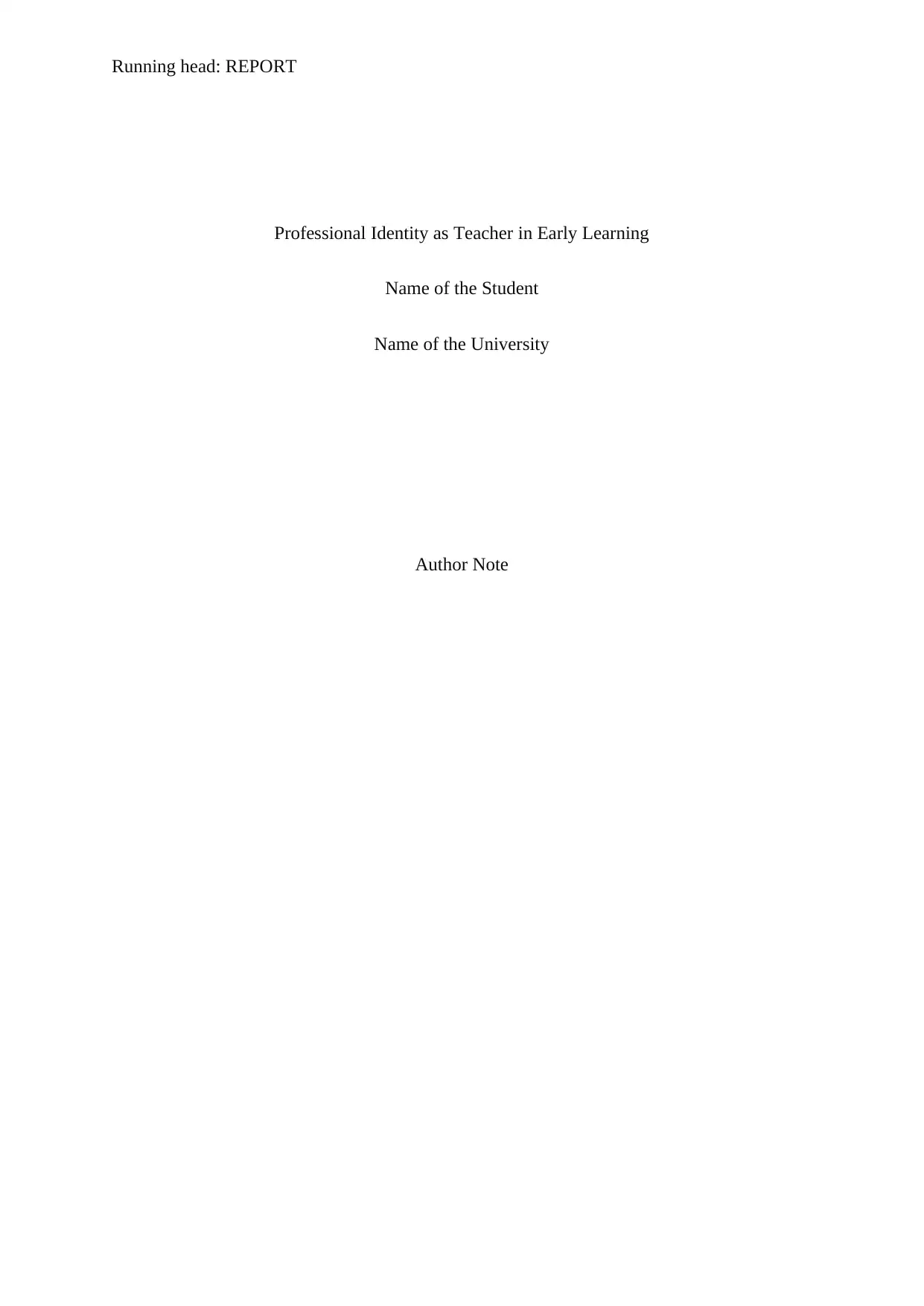
Running head: REPORT
Professional Identity as Teacher in Early Learning
Name of the Student
Name of the University
Author Note
Professional Identity as Teacher in Early Learning
Name of the Student
Name of the University
Author Note
Paraphrase This Document
Need a fresh take? Get an instant paraphrase of this document with our AI Paraphraser
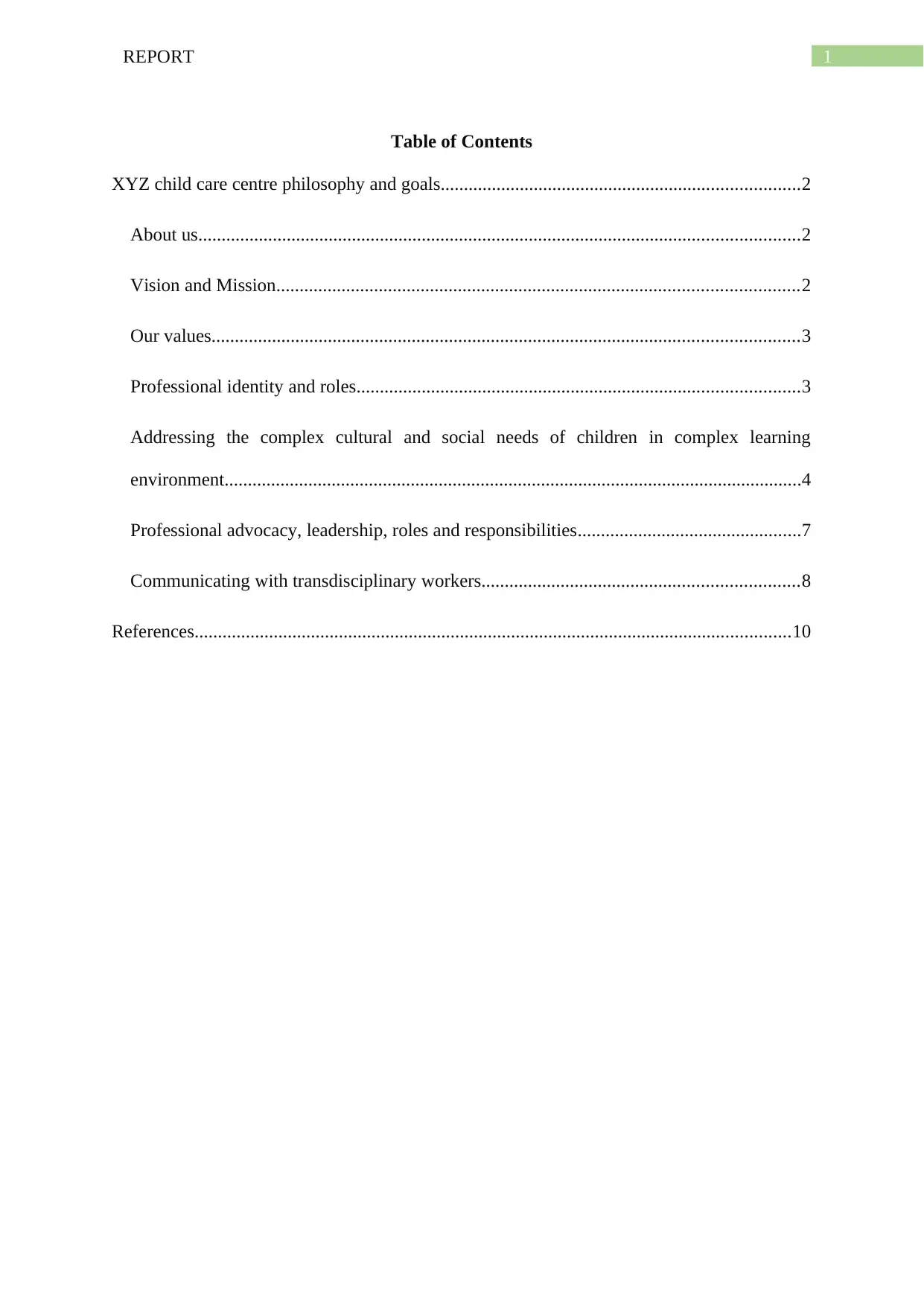
1REPORT
Table of Contents
XYZ child care centre philosophy and goals.............................................................................2
About us.................................................................................................................................2
Vision and Mission................................................................................................................2
Our values..............................................................................................................................3
Professional identity and roles...............................................................................................3
Addressing the complex cultural and social needs of children in complex learning
environment............................................................................................................................4
Professional advocacy, leadership, roles and responsibilities................................................7
Communicating with transdisciplinary workers....................................................................8
References................................................................................................................................10
Table of Contents
XYZ child care centre philosophy and goals.............................................................................2
About us.................................................................................................................................2
Vision and Mission................................................................................................................2
Our values..............................................................................................................................3
Professional identity and roles...............................................................................................3
Addressing the complex cultural and social needs of children in complex learning
environment............................................................................................................................4
Professional advocacy, leadership, roles and responsibilities................................................7
Communicating with transdisciplinary workers....................................................................8
References................................................................................................................................10
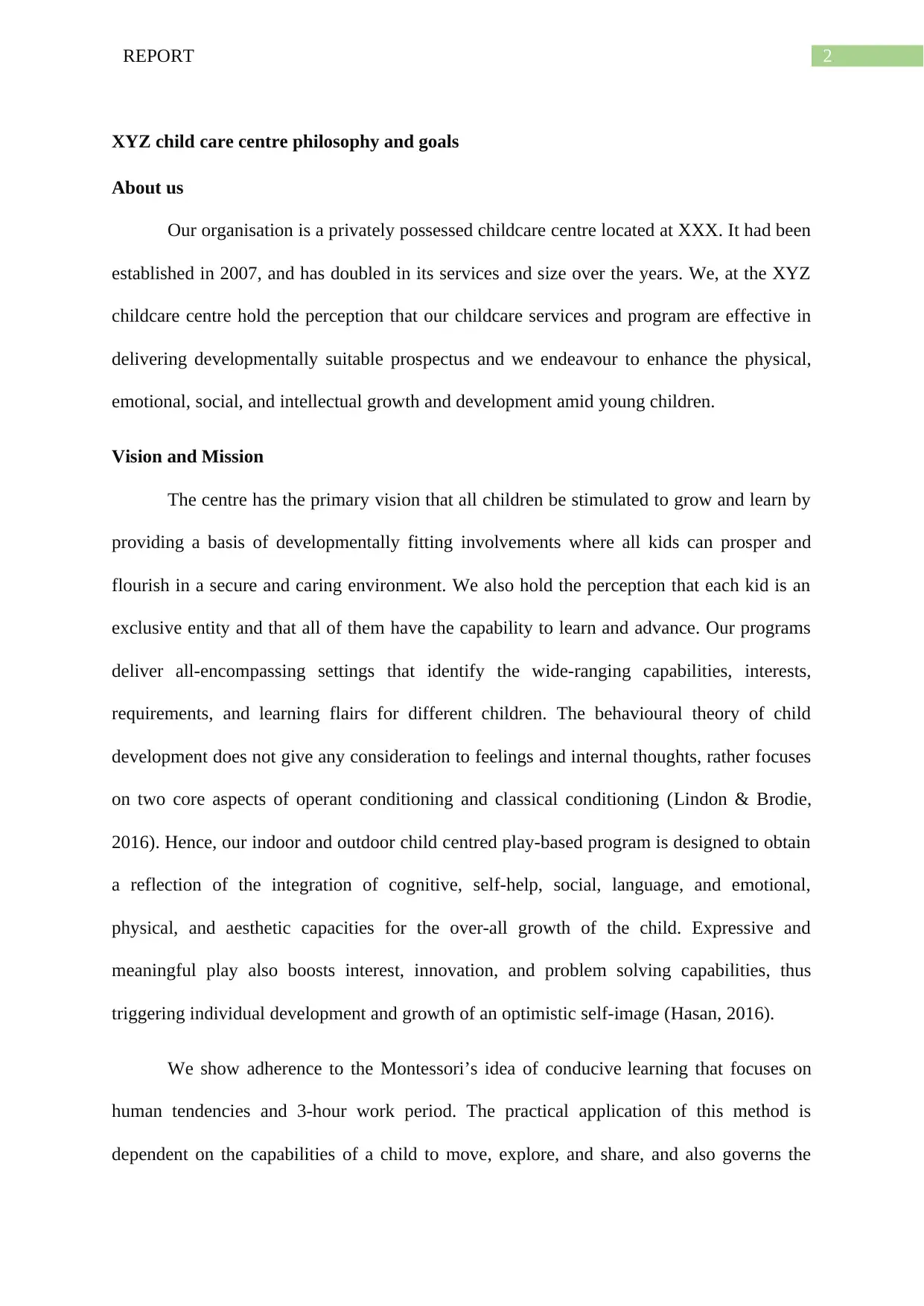
2REPORT
XYZ child care centre philosophy and goals
About us
Our organisation is a privately possessed childcare centre located at XXX. It had been
established in 2007, and has doubled in its services and size over the years. We, at the XYZ
childcare centre hold the perception that our childcare services and program are effective in
delivering developmentally suitable prospectus and we endeavour to enhance the physical,
emotional, social, and intellectual growth and development amid young children.
Vision and Mission
The centre has the primary vision that all children be stimulated to grow and learn by
providing a basis of developmentally fitting involvements where all kids can prosper and
flourish in a secure and caring environment. We also hold the perception that each kid is an
exclusive entity and that all of them have the capability to learn and advance. Our programs
deliver all-encompassing settings that identify the wide-ranging capabilities, interests,
requirements, and learning flairs for different children. The behavioural theory of child
development does not give any consideration to feelings and internal thoughts, rather focuses
on two core aspects of operant conditioning and classical conditioning (Lindon & Brodie,
2016). Hence, our indoor and outdoor child centred play-based program is designed to obtain
a reflection of the integration of cognitive, self-help, social, language, and emotional,
physical, and aesthetic capacities for the over-all growth of the child. Expressive and
meaningful play also boosts interest, innovation, and problem solving capabilities, thus
triggering individual development and growth of an optimistic self-image (Hasan, 2016).
We show adherence to the Montessori’s idea of conducive learning that focuses on
human tendencies and 3-hour work period. The practical application of this method is
dependent on the capabilities of a child to move, explore, and share, and also governs the
XYZ child care centre philosophy and goals
About us
Our organisation is a privately possessed childcare centre located at XXX. It had been
established in 2007, and has doubled in its services and size over the years. We, at the XYZ
childcare centre hold the perception that our childcare services and program are effective in
delivering developmentally suitable prospectus and we endeavour to enhance the physical,
emotional, social, and intellectual growth and development amid young children.
Vision and Mission
The centre has the primary vision that all children be stimulated to grow and learn by
providing a basis of developmentally fitting involvements where all kids can prosper and
flourish in a secure and caring environment. We also hold the perception that each kid is an
exclusive entity and that all of them have the capability to learn and advance. Our programs
deliver all-encompassing settings that identify the wide-ranging capabilities, interests,
requirements, and learning flairs for different children. The behavioural theory of child
development does not give any consideration to feelings and internal thoughts, rather focuses
on two core aspects of operant conditioning and classical conditioning (Lindon & Brodie,
2016). Hence, our indoor and outdoor child centred play-based program is designed to obtain
a reflection of the integration of cognitive, self-help, social, language, and emotional,
physical, and aesthetic capacities for the over-all growth of the child. Expressive and
meaningful play also boosts interest, innovation, and problem solving capabilities, thus
triggering individual development and growth of an optimistic self-image (Hasan, 2016).
We show adherence to the Montessori’s idea of conducive learning that focuses on
human tendencies and 3-hour work period. The practical application of this method is
dependent on the capabilities of a child to move, explore, and share, and also governs the
⊘ This is a preview!⊘
Do you want full access?
Subscribe today to unlock all pages.

Trusted by 1+ million students worldwide
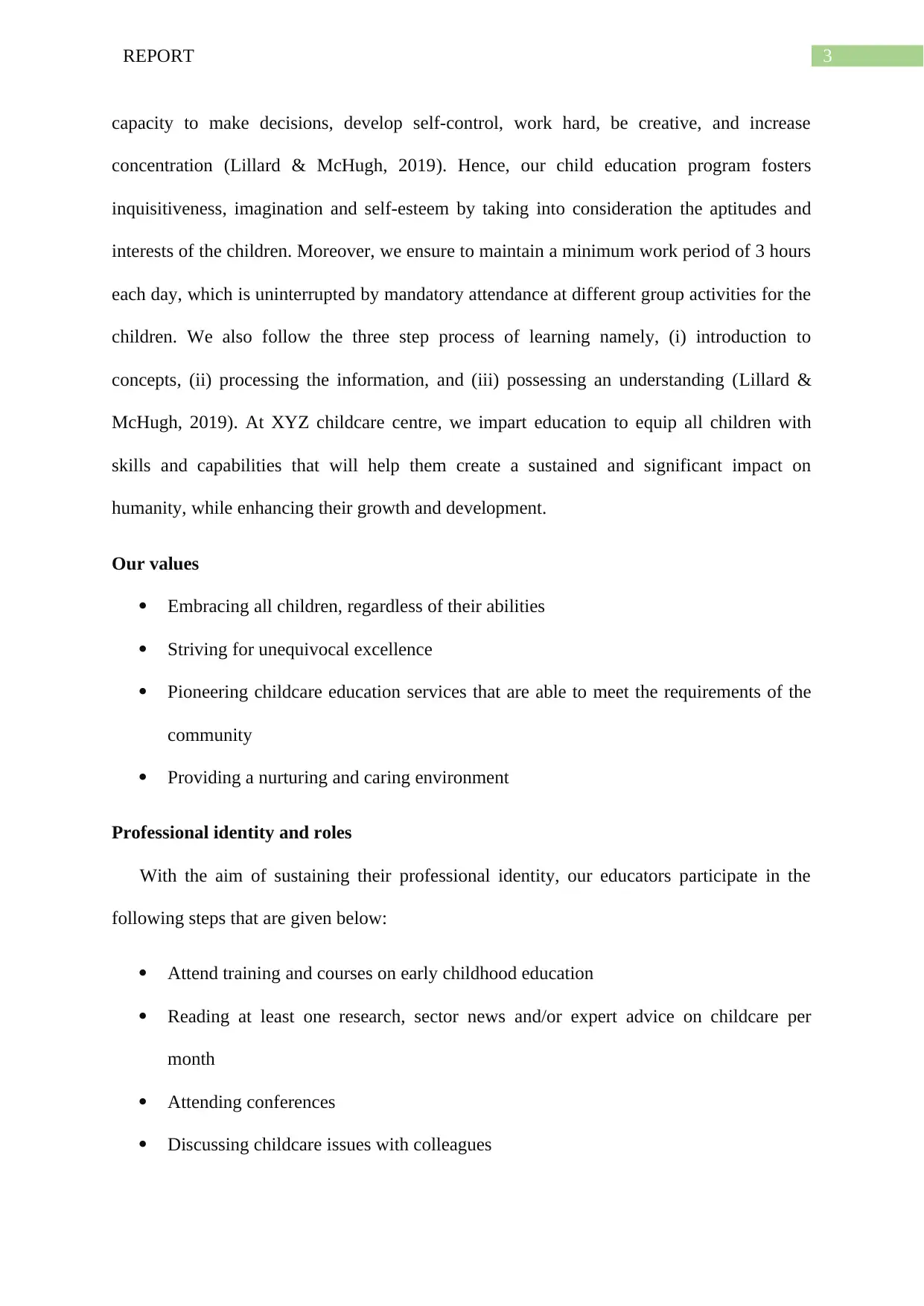
3REPORT
capacity to make decisions, develop self-control, work hard, be creative, and increase
concentration (Lillard & McHugh, 2019). Hence, our child education program fosters
inquisitiveness, imagination and self-esteem by taking into consideration the aptitudes and
interests of the children. Moreover, we ensure to maintain a minimum work period of 3 hours
each day, which is uninterrupted by mandatory attendance at different group activities for the
children. We also follow the three step process of learning namely, (i) introduction to
concepts, (ii) processing the information, and (iii) possessing an understanding (Lillard &
McHugh, 2019). At XYZ childcare centre, we impart education to equip all children with
skills and capabilities that will help them create a sustained and significant impact on
humanity, while enhancing their growth and development.
Our values
Embracing all children, regardless of their abilities
Striving for unequivocal excellence
Pioneering childcare education services that are able to meet the requirements of the
community
Providing a nurturing and caring environment
Professional identity and roles
With the aim of sustaining their professional identity, our educators participate in the
following steps that are given below:
Attend training and courses on early childhood education
Reading at least one research, sector news and/or expert advice on childcare per
month
Attending conferences
Discussing childcare issues with colleagues
capacity to make decisions, develop self-control, work hard, be creative, and increase
concentration (Lillard & McHugh, 2019). Hence, our child education program fosters
inquisitiveness, imagination and self-esteem by taking into consideration the aptitudes and
interests of the children. Moreover, we ensure to maintain a minimum work period of 3 hours
each day, which is uninterrupted by mandatory attendance at different group activities for the
children. We also follow the three step process of learning namely, (i) introduction to
concepts, (ii) processing the information, and (iii) possessing an understanding (Lillard &
McHugh, 2019). At XYZ childcare centre, we impart education to equip all children with
skills and capabilities that will help them create a sustained and significant impact on
humanity, while enhancing their growth and development.
Our values
Embracing all children, regardless of their abilities
Striving for unequivocal excellence
Pioneering childcare education services that are able to meet the requirements of the
community
Providing a nurturing and caring environment
Professional identity and roles
With the aim of sustaining their professional identity, our educators participate in the
following steps that are given below:
Attend training and courses on early childhood education
Reading at least one research, sector news and/or expert advice on childcare per
month
Attending conferences
Discussing childcare issues with colleagues
Paraphrase This Document
Need a fresh take? Get an instant paraphrase of this document with our AI Paraphraser
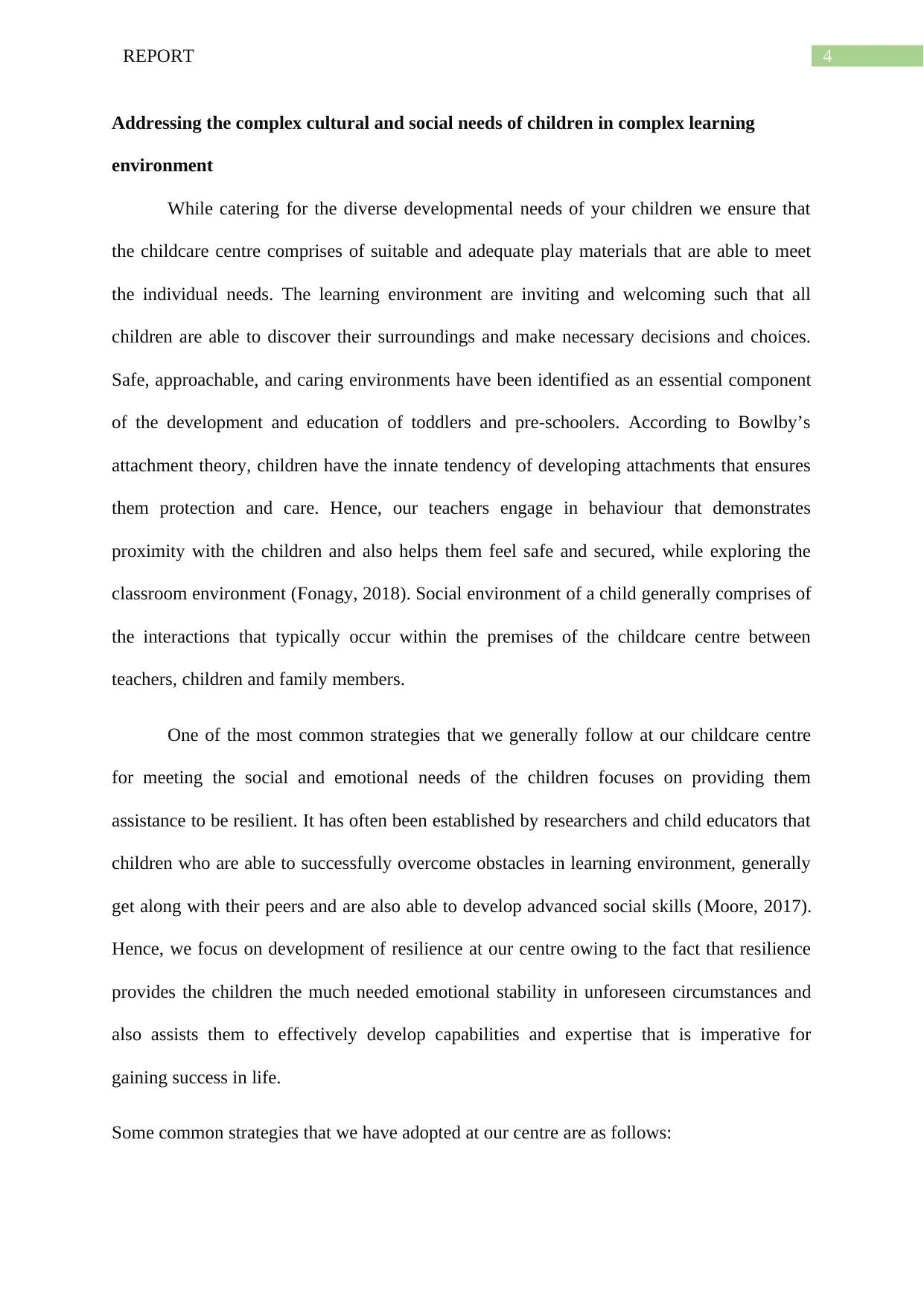
4REPORT
Addressing the complex cultural and social needs of children in complex learning
environment
While catering for the diverse developmental needs of your children we ensure that
the childcare centre comprises of suitable and adequate play materials that are able to meet
the individual needs. The learning environment are inviting and welcoming such that all
children are able to discover their surroundings and make necessary decisions and choices.
Safe, approachable, and caring environments have been identified as an essential component
of the development and education of toddlers and pre-schoolers. According to Bowlby’s
attachment theory, children have the innate tendency of developing attachments that ensures
them protection and care. Hence, our teachers engage in behaviour that demonstrates
proximity with the children and also helps them feel safe and secured, while exploring the
classroom environment (Fonagy, 2018). Social environment of a child generally comprises of
the interactions that typically occur within the premises of the childcare centre between
teachers, children and family members.
One of the most common strategies that we generally follow at our childcare centre
for meeting the social and emotional needs of the children focuses on providing them
assistance to be resilient. It has often been established by researchers and child educators that
children who are able to successfully overcome obstacles in learning environment, generally
get along with their peers and are also able to develop advanced social skills (Moore, 2017).
Hence, we focus on development of resilience at our centre owing to the fact that resilience
provides the children the much needed emotional stability in unforeseen circumstances and
also assists them to effectively develop capabilities and expertise that is imperative for
gaining success in life.
Some common strategies that we have adopted at our centre are as follows:
Addressing the complex cultural and social needs of children in complex learning
environment
While catering for the diverse developmental needs of your children we ensure that
the childcare centre comprises of suitable and adequate play materials that are able to meet
the individual needs. The learning environment are inviting and welcoming such that all
children are able to discover their surroundings and make necessary decisions and choices.
Safe, approachable, and caring environments have been identified as an essential component
of the development and education of toddlers and pre-schoolers. According to Bowlby’s
attachment theory, children have the innate tendency of developing attachments that ensures
them protection and care. Hence, our teachers engage in behaviour that demonstrates
proximity with the children and also helps them feel safe and secured, while exploring the
classroom environment (Fonagy, 2018). Social environment of a child generally comprises of
the interactions that typically occur within the premises of the childcare centre between
teachers, children and family members.
One of the most common strategies that we generally follow at our childcare centre
for meeting the social and emotional needs of the children focuses on providing them
assistance to be resilient. It has often been established by researchers and child educators that
children who are able to successfully overcome obstacles in learning environment, generally
get along with their peers and are also able to develop advanced social skills (Moore, 2017).
Hence, we focus on development of resilience at our centre owing to the fact that resilience
provides the children the much needed emotional stability in unforeseen circumstances and
also assists them to effectively develop capabilities and expertise that is imperative for
gaining success in life.
Some common strategies that we have adopted at our centre are as follows:
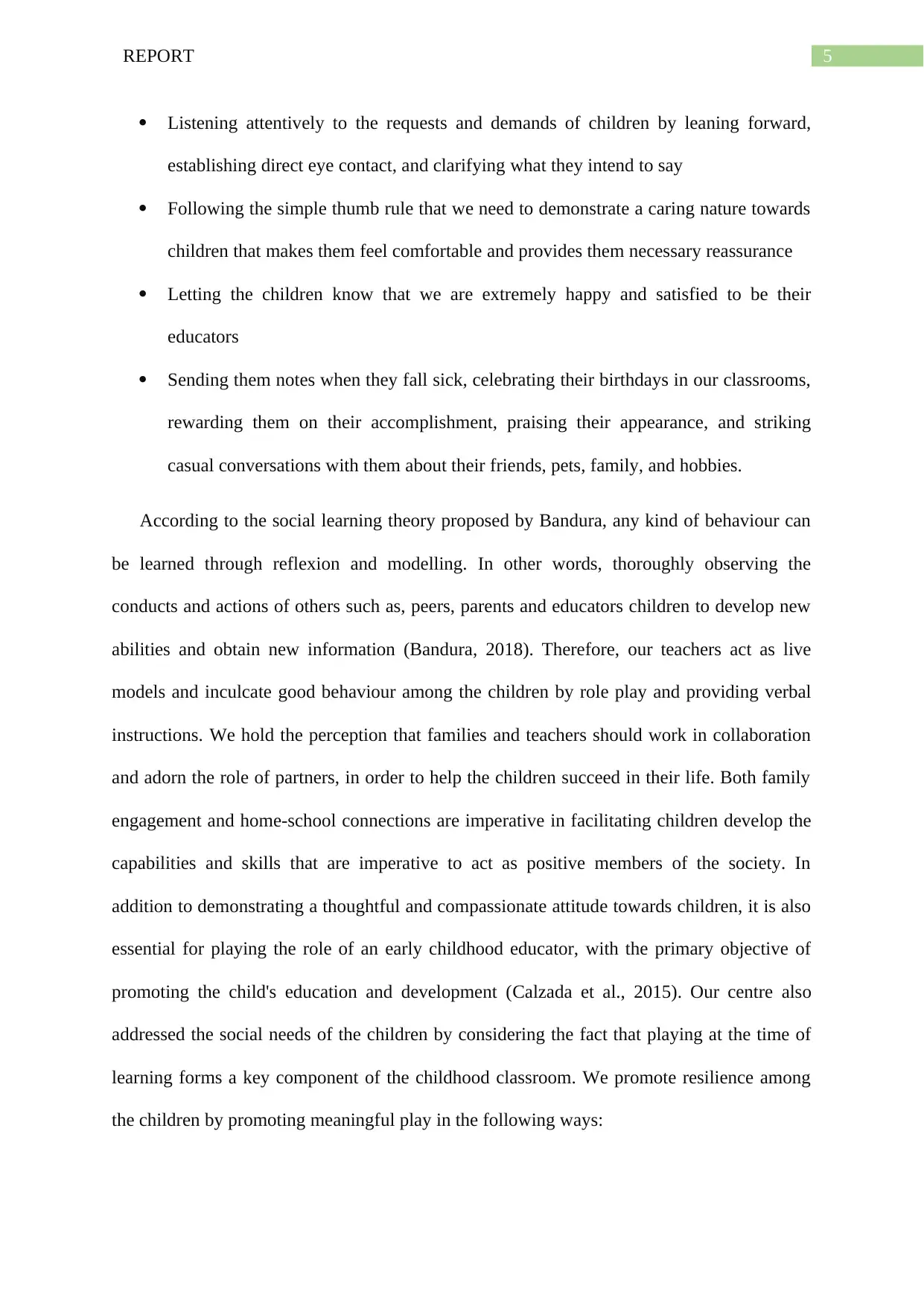
5REPORT
Listening attentively to the requests and demands of children by leaning forward,
establishing direct eye contact, and clarifying what they intend to say
Following the simple thumb rule that we need to demonstrate a caring nature towards
children that makes them feel comfortable and provides them necessary reassurance
Letting the children know that we are extremely happy and satisfied to be their
educators
Sending them notes when they fall sick, celebrating their birthdays in our classrooms,
rewarding them on their accomplishment, praising their appearance, and striking
casual conversations with them about their friends, pets, family, and hobbies.
According to the social learning theory proposed by Bandura, any kind of behaviour can
be learned through reflexion and modelling. In other words, thoroughly observing the
conducts and actions of others such as, peers, parents and educators children to develop new
abilities and obtain new information (Bandura, 2018). Therefore, our teachers act as live
models and inculcate good behaviour among the children by role play and providing verbal
instructions. We hold the perception that families and teachers should work in collaboration
and adorn the role of partners, in order to help the children succeed in their life. Both family
engagement and home-school connections are imperative in facilitating children develop the
capabilities and skills that are imperative to act as positive members of the society. In
addition to demonstrating a thoughtful and compassionate attitude towards children, it is also
essential for playing the role of an early childhood educator, with the primary objective of
promoting the child's education and development (Calzada et al., 2015). Our centre also
addressed the social needs of the children by considering the fact that playing at the time of
learning forms a key component of the childhood classroom. We promote resilience among
the children by promoting meaningful play in the following ways:
Listening attentively to the requests and demands of children by leaning forward,
establishing direct eye contact, and clarifying what they intend to say
Following the simple thumb rule that we need to demonstrate a caring nature towards
children that makes them feel comfortable and provides them necessary reassurance
Letting the children know that we are extremely happy and satisfied to be their
educators
Sending them notes when they fall sick, celebrating their birthdays in our classrooms,
rewarding them on their accomplishment, praising their appearance, and striking
casual conversations with them about their friends, pets, family, and hobbies.
According to the social learning theory proposed by Bandura, any kind of behaviour can
be learned through reflexion and modelling. In other words, thoroughly observing the
conducts and actions of others such as, peers, parents and educators children to develop new
abilities and obtain new information (Bandura, 2018). Therefore, our teachers act as live
models and inculcate good behaviour among the children by role play and providing verbal
instructions. We hold the perception that families and teachers should work in collaboration
and adorn the role of partners, in order to help the children succeed in their life. Both family
engagement and home-school connections are imperative in facilitating children develop the
capabilities and skills that are imperative to act as positive members of the society. In
addition to demonstrating a thoughtful and compassionate attitude towards children, it is also
essential for playing the role of an early childhood educator, with the primary objective of
promoting the child's education and development (Calzada et al., 2015). Our centre also
addressed the social needs of the children by considering the fact that playing at the time of
learning forms a key component of the childhood classroom. We promote resilience among
the children by promoting meaningful play in the following ways:
⊘ This is a preview!⊘
Do you want full access?
Subscribe today to unlock all pages.

Trusted by 1+ million students worldwide
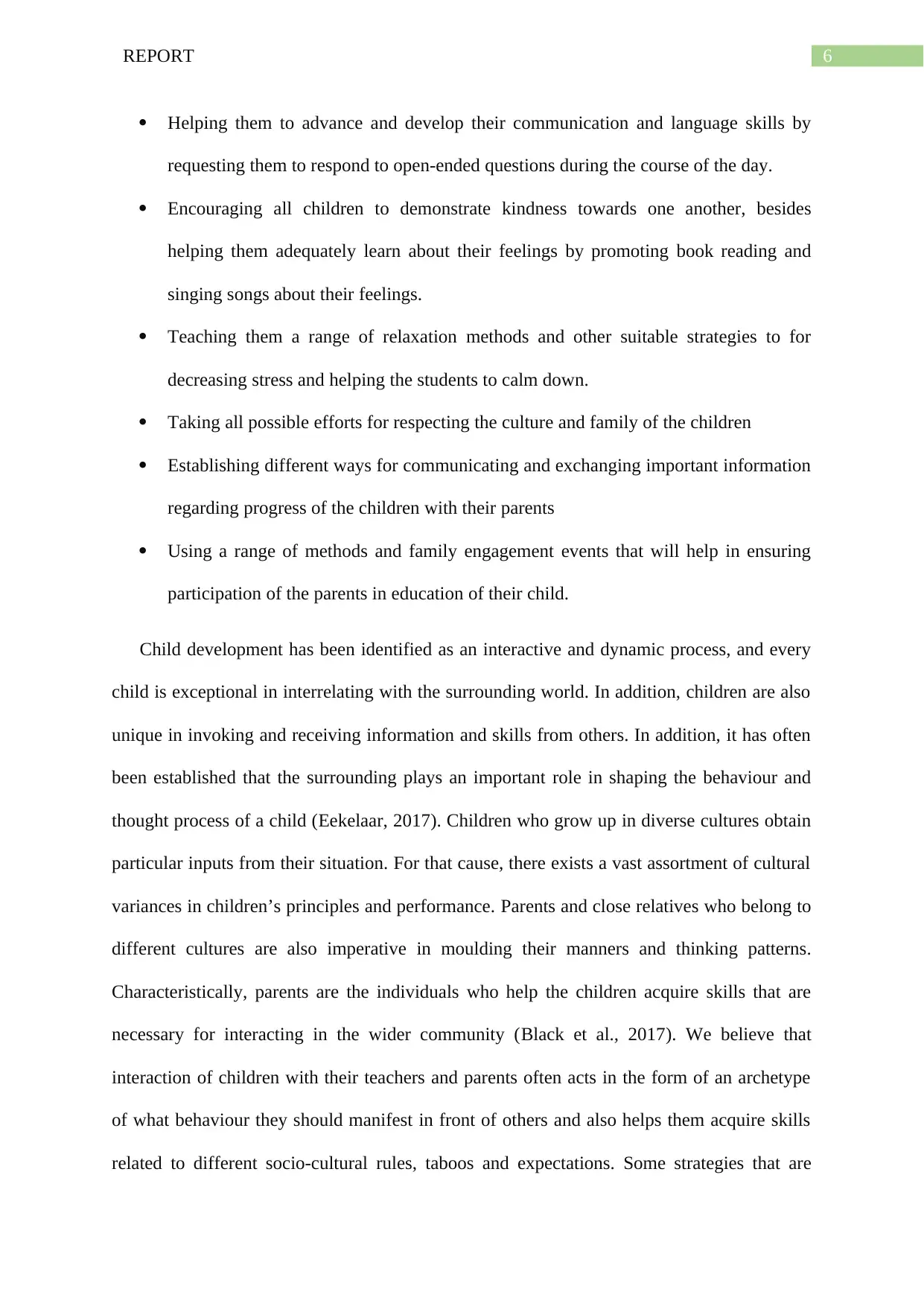
6REPORT
Helping them to advance and develop their communication and language skills by
requesting them to respond to open-ended questions during the course of the day.
Encouraging all children to demonstrate kindness towards one another, besides
helping them adequately learn about their feelings by promoting book reading and
singing songs about their feelings.
Teaching them a range of relaxation methods and other suitable strategies to for
decreasing stress and helping the students to calm down.
Taking all possible efforts for respecting the culture and family of the children
Establishing different ways for communicating and exchanging important information
regarding progress of the children with their parents
Using a range of methods and family engagement events that will help in ensuring
participation of the parents in education of their child.
Child development has been identified as an interactive and dynamic process, and every
child is exceptional in interrelating with the surrounding world. In addition, children are also
unique in invoking and receiving information and skills from others. In addition, it has often
been established that the surrounding plays an important role in shaping the behaviour and
thought process of a child (Eekelaar, 2017). Children who grow up in diverse cultures obtain
particular inputs from their situation. For that cause, there exists a vast assortment of cultural
variances in children’s principles and performance. Parents and close relatives who belong to
different cultures are also imperative in moulding their manners and thinking patterns.
Characteristically, parents are the individuals who help the children acquire skills that are
necessary for interacting in the wider community (Black et al., 2017). We believe that
interaction of children with their teachers and parents often acts in the form of an archetype
of what behaviour they should manifest in front of others and also helps them acquire skills
related to different socio-cultural rules, taboos and expectations. Some strategies that are
Helping them to advance and develop their communication and language skills by
requesting them to respond to open-ended questions during the course of the day.
Encouraging all children to demonstrate kindness towards one another, besides
helping them adequately learn about their feelings by promoting book reading and
singing songs about their feelings.
Teaching them a range of relaxation methods and other suitable strategies to for
decreasing stress and helping the students to calm down.
Taking all possible efforts for respecting the culture and family of the children
Establishing different ways for communicating and exchanging important information
regarding progress of the children with their parents
Using a range of methods and family engagement events that will help in ensuring
participation of the parents in education of their child.
Child development has been identified as an interactive and dynamic process, and every
child is exceptional in interrelating with the surrounding world. In addition, children are also
unique in invoking and receiving information and skills from others. In addition, it has often
been established that the surrounding plays an important role in shaping the behaviour and
thought process of a child (Eekelaar, 2017). Children who grow up in diverse cultures obtain
particular inputs from their situation. For that cause, there exists a vast assortment of cultural
variances in children’s principles and performance. Parents and close relatives who belong to
different cultures are also imperative in moulding their manners and thinking patterns.
Characteristically, parents are the individuals who help the children acquire skills that are
necessary for interacting in the wider community (Black et al., 2017). We believe that
interaction of children with their teachers and parents often acts in the form of an archetype
of what behaviour they should manifest in front of others and also helps them acquire skills
related to different socio-cultural rules, taboos and expectations. Some strategies that are
Paraphrase This Document
Need a fresh take? Get an instant paraphrase of this document with our AI Paraphraser
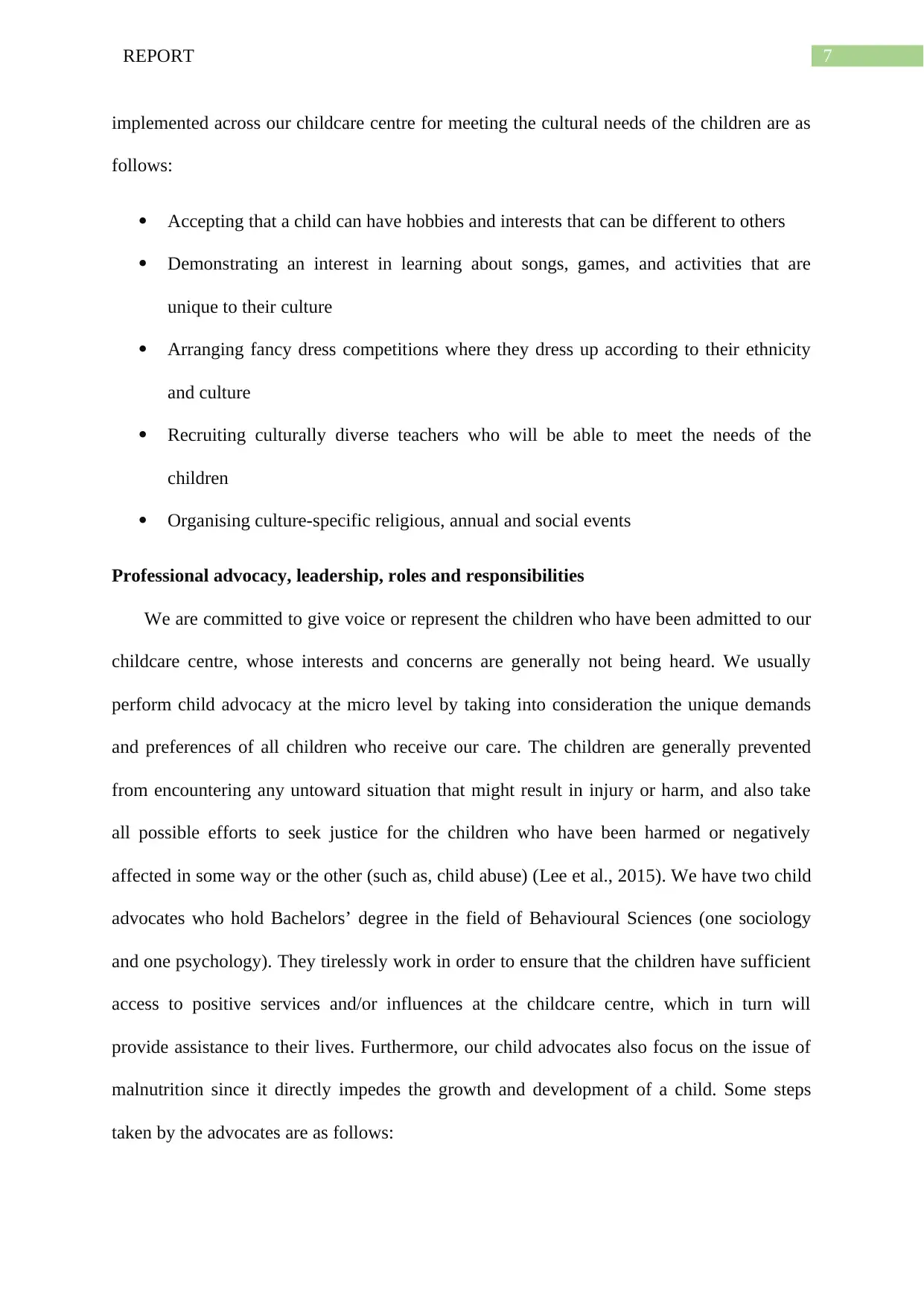
7REPORT
implemented across our childcare centre for meeting the cultural needs of the children are as
follows:
Accepting that a child can have hobbies and interests that can be different to others
Demonstrating an interest in learning about songs, games, and activities that are
unique to their culture
Arranging fancy dress competitions where they dress up according to their ethnicity
and culture
Recruiting culturally diverse teachers who will be able to meet the needs of the
children
Organising culture-specific religious, annual and social events
Professional advocacy, leadership, roles and responsibilities
We are committed to give voice or represent the children who have been admitted to our
childcare centre, whose interests and concerns are generally not being heard. We usually
perform child advocacy at the micro level by taking into consideration the unique demands
and preferences of all children who receive our care. The children are generally prevented
from encountering any untoward situation that might result in injury or harm, and also take
all possible efforts to seek justice for the children who have been harmed or negatively
affected in some way or the other (such as, child abuse) (Lee et al., 2015). We have two child
advocates who hold Bachelors’ degree in the field of Behavioural Sciences (one sociology
and one psychology). They tirelessly work in order to ensure that the children have sufficient
access to positive services and/or influences at the childcare centre, which in turn will
provide assistance to their lives. Furthermore, our child advocates also focus on the issue of
malnutrition since it directly impedes the growth and development of a child. Some steps
taken by the advocates are as follows:
implemented across our childcare centre for meeting the cultural needs of the children are as
follows:
Accepting that a child can have hobbies and interests that can be different to others
Demonstrating an interest in learning about songs, games, and activities that are
unique to their culture
Arranging fancy dress competitions where they dress up according to their ethnicity
and culture
Recruiting culturally diverse teachers who will be able to meet the needs of the
children
Organising culture-specific religious, annual and social events
Professional advocacy, leadership, roles and responsibilities
We are committed to give voice or represent the children who have been admitted to our
childcare centre, whose interests and concerns are generally not being heard. We usually
perform child advocacy at the micro level by taking into consideration the unique demands
and preferences of all children who receive our care. The children are generally prevented
from encountering any untoward situation that might result in injury or harm, and also take
all possible efforts to seek justice for the children who have been harmed or negatively
affected in some way or the other (such as, child abuse) (Lee et al., 2015). We have two child
advocates who hold Bachelors’ degree in the field of Behavioural Sciences (one sociology
and one psychology). They tirelessly work in order to ensure that the children have sufficient
access to positive services and/or influences at the childcare centre, which in turn will
provide assistance to their lives. Furthermore, our child advocates also focus on the issue of
malnutrition since it directly impedes the growth and development of a child. Some steps
taken by the advocates are as follows:
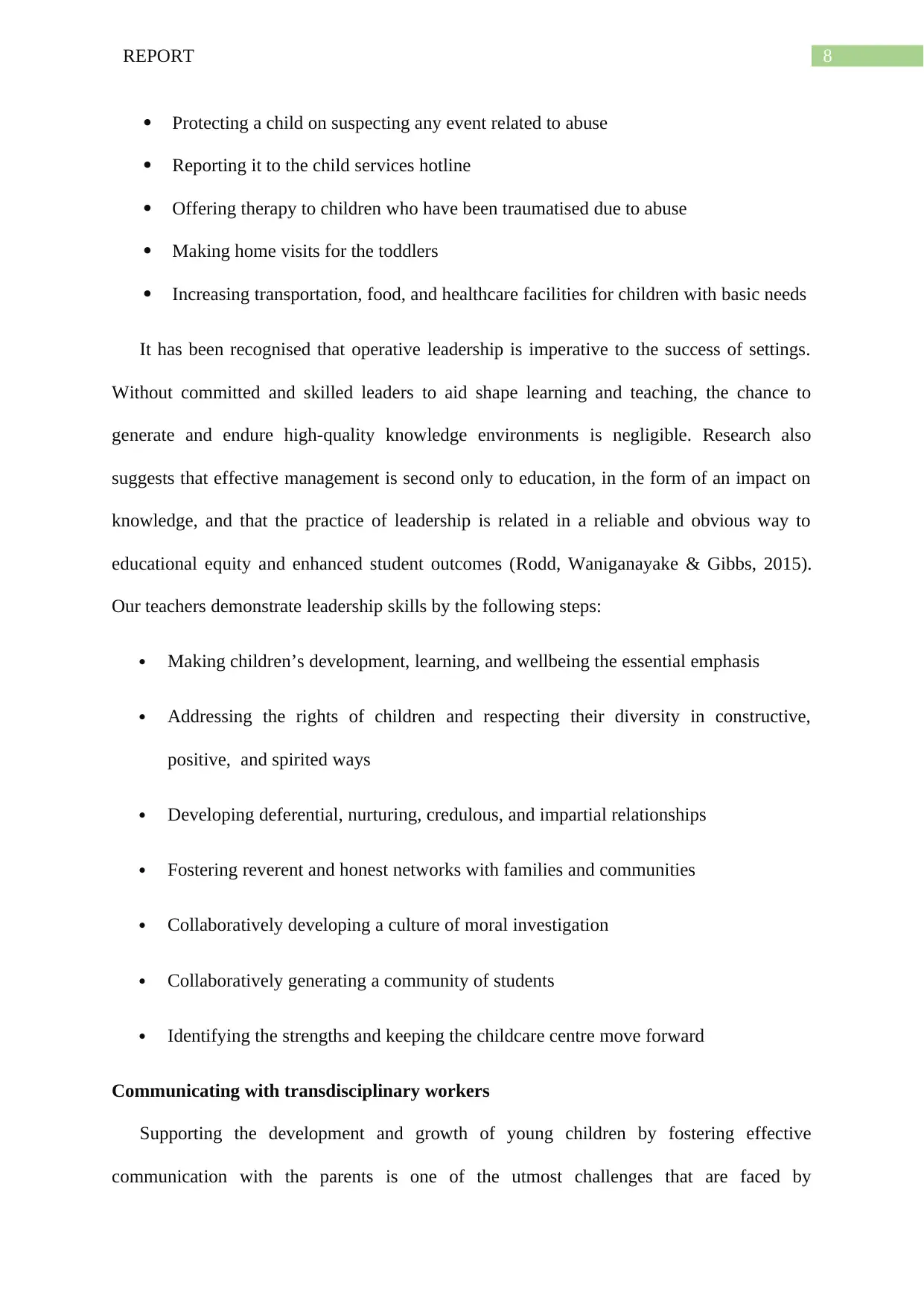
8REPORT
Protecting a child on suspecting any event related to abuse
Reporting it to the child services hotline
Offering therapy to children who have been traumatised due to abuse
Making home visits for the toddlers
Increasing transportation, food, and healthcare facilities for children with basic needs
It has been recognised that operative leadership is imperative to the success of settings.
Without committed and skilled leaders to aid shape learning and teaching, the chance to
generate and endure high-quality knowledge environments is negligible. Research also
suggests that effective management is second only to education, in the form of an impact on
knowledge, and that the practice of leadership is related in a reliable and obvious way to
educational equity and enhanced student outcomes (Rodd, Waniganayake & Gibbs, 2015).
Our teachers demonstrate leadership skills by the following steps:
Making children’s development, learning, and wellbeing the essential emphasis
Addressing the rights of children and respecting their diversity in constructive,
positive, and spirited ways
Developing deferential, nurturing, credulous, and impartial relationships
Fostering reverent and honest networks with families and communities
Collaboratively developing a culture of moral investigation
Collaboratively generating a community of students
Identifying the strengths and keeping the childcare centre move forward
Communicating with transdisciplinary workers
Supporting the development and growth of young children by fostering effective
communication with the parents is one of the utmost challenges that are faced by
Protecting a child on suspecting any event related to abuse
Reporting it to the child services hotline
Offering therapy to children who have been traumatised due to abuse
Making home visits for the toddlers
Increasing transportation, food, and healthcare facilities for children with basic needs
It has been recognised that operative leadership is imperative to the success of settings.
Without committed and skilled leaders to aid shape learning and teaching, the chance to
generate and endure high-quality knowledge environments is negligible. Research also
suggests that effective management is second only to education, in the form of an impact on
knowledge, and that the practice of leadership is related in a reliable and obvious way to
educational equity and enhanced student outcomes (Rodd, Waniganayake & Gibbs, 2015).
Our teachers demonstrate leadership skills by the following steps:
Making children’s development, learning, and wellbeing the essential emphasis
Addressing the rights of children and respecting their diversity in constructive,
positive, and spirited ways
Developing deferential, nurturing, credulous, and impartial relationships
Fostering reverent and honest networks with families and communities
Collaboratively developing a culture of moral investigation
Collaboratively generating a community of students
Identifying the strengths and keeping the childcare centre move forward
Communicating with transdisciplinary workers
Supporting the development and growth of young children by fostering effective
communication with the parents is one of the utmost challenges that are faced by
⊘ This is a preview!⊘
Do you want full access?
Subscribe today to unlock all pages.

Trusted by 1+ million students worldwide
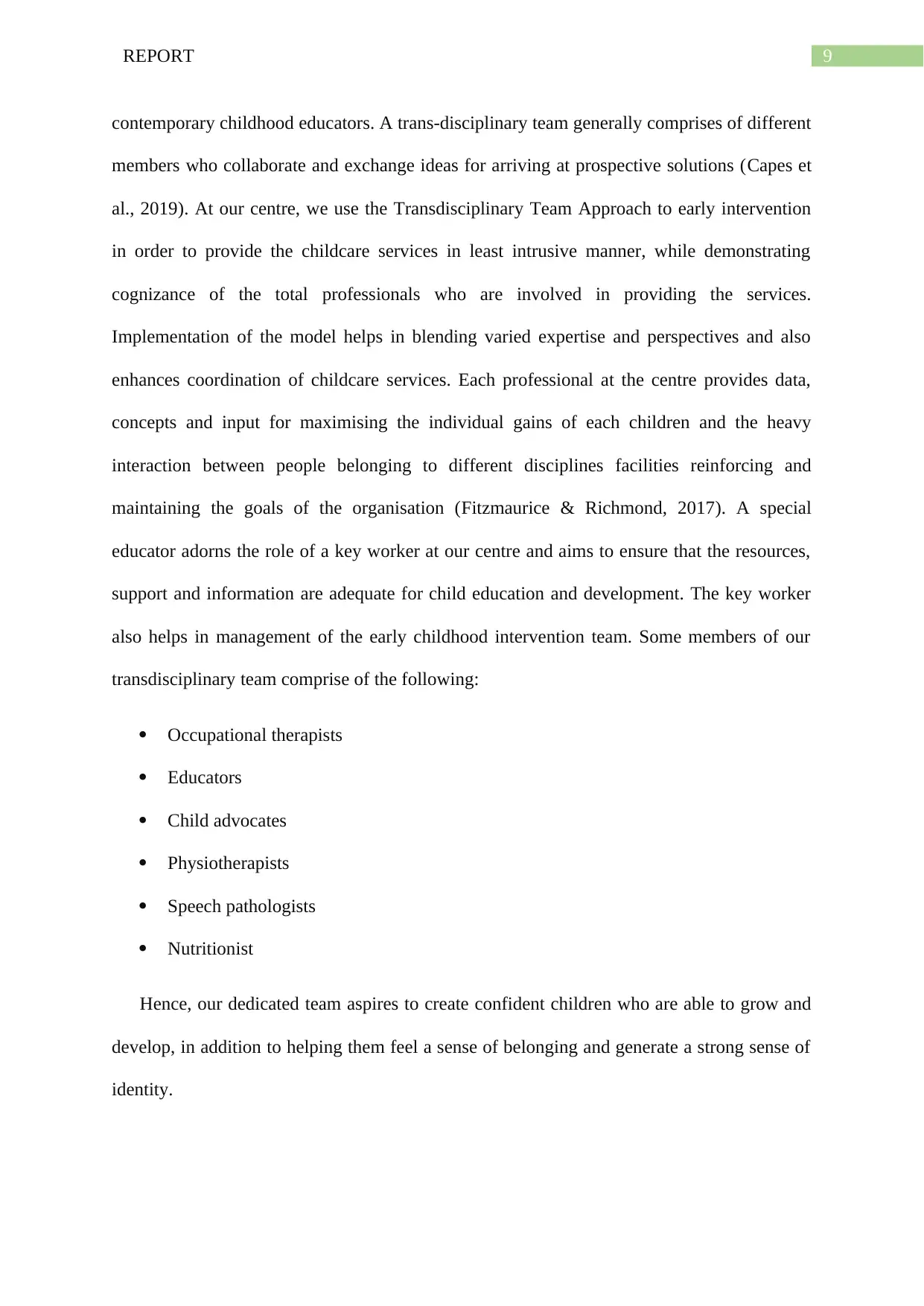
9REPORT
contemporary childhood educators. A trans-disciplinary team generally comprises of different
members who collaborate and exchange ideas for arriving at prospective solutions (Capes et
al., 2019). At our centre, we use the Transdisciplinary Team Approach to early intervention
in order to provide the childcare services in least intrusive manner, while demonstrating
cognizance of the total professionals who are involved in providing the services.
Implementation of the model helps in blending varied expertise and perspectives and also
enhances coordination of childcare services. Each professional at the centre provides data,
concepts and input for maximising the individual gains of each children and the heavy
interaction between people belonging to different disciplines facilities reinforcing and
maintaining the goals of the organisation (Fitzmaurice & Richmond, 2017). A special
educator adorns the role of a key worker at our centre and aims to ensure that the resources,
support and information are adequate for child education and development. The key worker
also helps in management of the early childhood intervention team. Some members of our
transdisciplinary team comprise of the following:
Occupational therapists
Educators
Child advocates
Physiotherapists
Speech pathologists
Nutritionist
Hence, our dedicated team aspires to create confident children who are able to grow and
develop, in addition to helping them feel a sense of belonging and generate a strong sense of
identity.
contemporary childhood educators. A trans-disciplinary team generally comprises of different
members who collaborate and exchange ideas for arriving at prospective solutions (Capes et
al., 2019). At our centre, we use the Transdisciplinary Team Approach to early intervention
in order to provide the childcare services in least intrusive manner, while demonstrating
cognizance of the total professionals who are involved in providing the services.
Implementation of the model helps in blending varied expertise and perspectives and also
enhances coordination of childcare services. Each professional at the centre provides data,
concepts and input for maximising the individual gains of each children and the heavy
interaction between people belonging to different disciplines facilities reinforcing and
maintaining the goals of the organisation (Fitzmaurice & Richmond, 2017). A special
educator adorns the role of a key worker at our centre and aims to ensure that the resources,
support and information are adequate for child education and development. The key worker
also helps in management of the early childhood intervention team. Some members of our
transdisciplinary team comprise of the following:
Occupational therapists
Educators
Child advocates
Physiotherapists
Speech pathologists
Nutritionist
Hence, our dedicated team aspires to create confident children who are able to grow and
develop, in addition to helping them feel a sense of belonging and generate a strong sense of
identity.
Paraphrase This Document
Need a fresh take? Get an instant paraphrase of this document with our AI Paraphraser

10REPORT
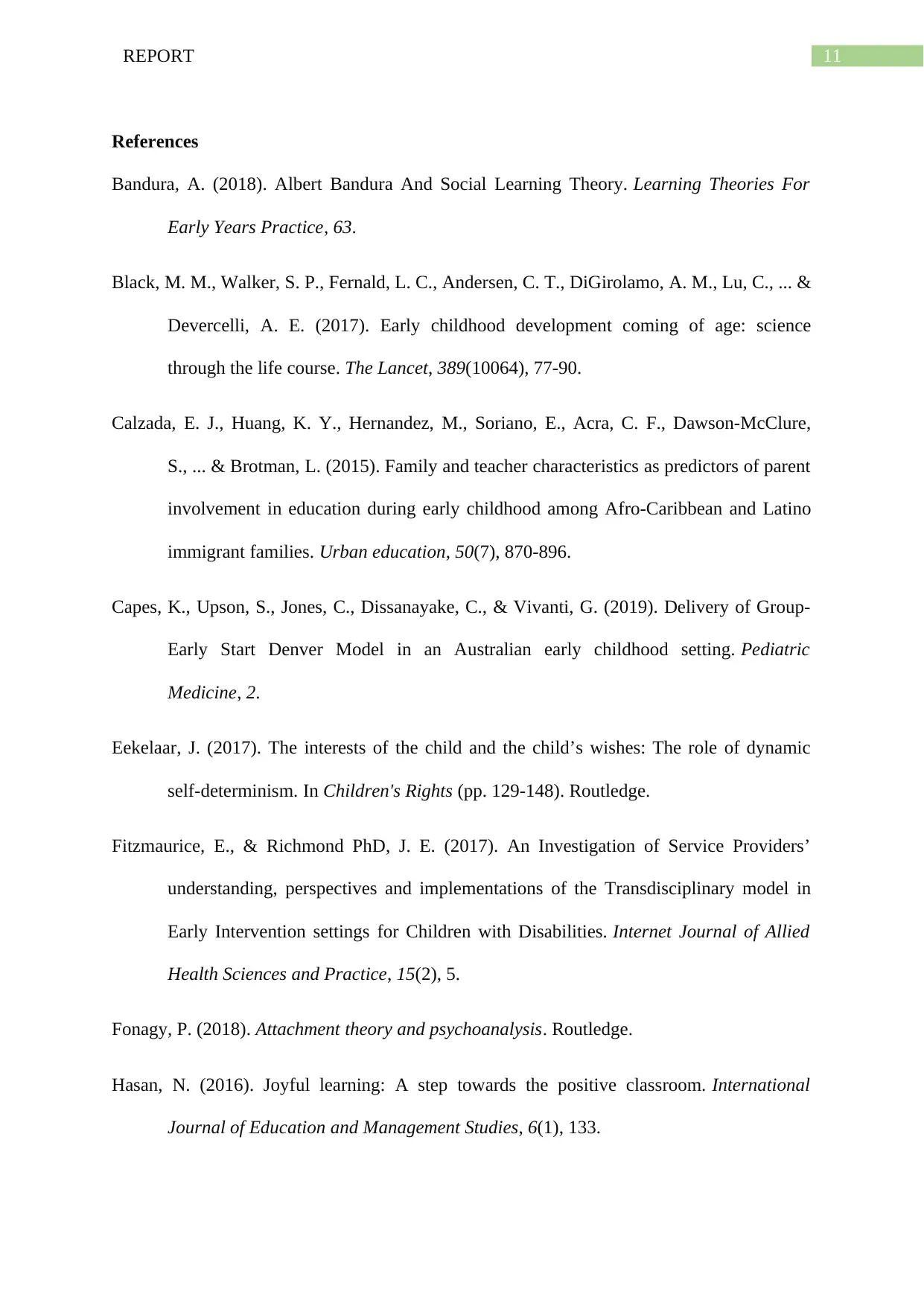
11REPORT
References
Bandura, A. (2018). Albert Bandura And Social Learning Theory. Learning Theories For
Early Years Practice, 63.
Black, M. M., Walker, S. P., Fernald, L. C., Andersen, C. T., DiGirolamo, A. M., Lu, C., ... &
Devercelli, A. E. (2017). Early childhood development coming of age: science
through the life course. The Lancet, 389(10064), 77-90.
Calzada, E. J., Huang, K. Y., Hernandez, M., Soriano, E., Acra, C. F., Dawson-McClure,
S., ... & Brotman, L. (2015). Family and teacher characteristics as predictors of parent
involvement in education during early childhood among Afro-Caribbean and Latino
immigrant families. Urban education, 50(7), 870-896.
Capes, K., Upson, S., Jones, C., Dissanayake, C., & Vivanti, G. (2019). Delivery of Group-
Early Start Denver Model in an Australian early childhood setting. Pediatric
Medicine, 2.
Eekelaar, J. (2017). The interests of the child and the child’s wishes: The role of dynamic
self-determinism. In Children's Rights (pp. 129-148). Routledge.
Fitzmaurice, E., & Richmond PhD, J. E. (2017). An Investigation of Service Providers’
understanding, perspectives and implementations of the Transdisciplinary model in
Early Intervention settings for Children with Disabilities. Internet Journal of Allied
Health Sciences and Practice, 15(2), 5.
Fonagy, P. (2018). Attachment theory and psychoanalysis. Routledge.
Hasan, N. (2016). Joyful learning: A step towards the positive classroom. International
Journal of Education and Management Studies, 6(1), 133.
References
Bandura, A. (2018). Albert Bandura And Social Learning Theory. Learning Theories For
Early Years Practice, 63.
Black, M. M., Walker, S. P., Fernald, L. C., Andersen, C. T., DiGirolamo, A. M., Lu, C., ... &
Devercelli, A. E. (2017). Early childhood development coming of age: science
through the life course. The Lancet, 389(10064), 77-90.
Calzada, E. J., Huang, K. Y., Hernandez, M., Soriano, E., Acra, C. F., Dawson-McClure,
S., ... & Brotman, L. (2015). Family and teacher characteristics as predictors of parent
involvement in education during early childhood among Afro-Caribbean and Latino
immigrant families. Urban education, 50(7), 870-896.
Capes, K., Upson, S., Jones, C., Dissanayake, C., & Vivanti, G. (2019). Delivery of Group-
Early Start Denver Model in an Australian early childhood setting. Pediatric
Medicine, 2.
Eekelaar, J. (2017). The interests of the child and the child’s wishes: The role of dynamic
self-determinism. In Children's Rights (pp. 129-148). Routledge.
Fitzmaurice, E., & Richmond PhD, J. E. (2017). An Investigation of Service Providers’
understanding, perspectives and implementations of the Transdisciplinary model in
Early Intervention settings for Children with Disabilities. Internet Journal of Allied
Health Sciences and Practice, 15(2), 5.
Fonagy, P. (2018). Attachment theory and psychoanalysis. Routledge.
Hasan, N. (2016). Joyful learning: A step towards the positive classroom. International
Journal of Education and Management Studies, 6(1), 133.
⊘ This is a preview!⊘
Do you want full access?
Subscribe today to unlock all pages.

Trusted by 1+ million students worldwide
1 out of 13
Related Documents
Your All-in-One AI-Powered Toolkit for Academic Success.
+13062052269
info@desklib.com
Available 24*7 on WhatsApp / Email
![[object Object]](/_next/static/media/star-bottom.7253800d.svg)
Unlock your academic potential
Copyright © 2020–2025 A2Z Services. All Rights Reserved. Developed and managed by ZUCOL.




